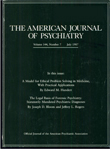Few would dispute that DSM-IV has been a major success in reestablishing the reliability (if not the validity) of psychiatric diagnosis in the United States. With their empirical, phenomenological orientation and categorical taxonomy, the DSMs, from the third edition onward, represent the resurgence and near triumph of neo-Kraepelinian psychiatry. In the sphere of psychiatric diagnosis, the atheoretical DSM approach now seems to predominate, having supplanted psychodynamic and other approaches to the conceptualization of the human psyche and its disorders.
The translation of DSM diagnoses into models of treatment has been much less successful. The remedicalization of psychiatry, the deemphasis of psychological factors, and an increasing emphasis on psychopharmacological approaches await the fervently sought linkage between psychopathological diagnoses and the “silver bullet” of psychotropic medications.
In contrast to psychiatric diagnosis, theories of treatment continue to reflect and rely on clinical theories of human nature and adaptation. In this sphere, the theories of Freud, his followers, and neo-Freudian innovators, supplemented by more modern cognitive, interpersonal, and systems approaches, continue to hold sway.
Psychopathology and Psychotherapy links DSM-IV diagnoses to the theoretical and psychotherapeutic thinking of Alfred Adler's “individual psychology.” In contrast to the abstract metapsychological theorizing of his early mentor, Sigmund Freud, the Adlerian approach—with its core notion of the “life style” as central to understanding human function and dysfunction—is pragmatic and largely couched in the language of ordinary experience. Since few clinicians ordinarily encounter Adler's approach in their training and education, the current volume provides a primer of Adlerian concepts. Additionally, the reader is introduced to the importance of “clinical formulation” in the understanding of the individual patient. Later developments in Adlerian theory are much more akin to today's social learning, interpersonal, and cognitive psychotherapies. In contrast to the DSM-IV approach, Adlerian diagnoses and treatment are psychological in nature and integrate etiologic, psychodynamic, cognitive, and systems approaches.
After introducing Adlerian concepts and contrasting them to DSM, the remaining chapters review the various DSM-IV diagnostic criteria, recast the DSM-IV diagnosis in Adlerian clinical concepts, outline treatment strategies, and illustrate with reasonable case examples.
Psychotherapy and Psychopathology would appear to be most useful as a textbook for graduate students in clinical and counseling psychology, for psychiatric residents in courses in psychopathology, and for the clinical supervision of novice counselors and psychotherapists. The obvious virtue of the book is its explicit, jargon-free linkages among diagnosis, clinical formulation, and concrete strategies of treatment. My third-year psychiatric residents in psychotherapy supervision struggle to move from the inpatient unit with the focus on DSM-IV diagnosis, stabilization, and case disposition to the more sustained, detailed, and nuanced understanding of the psychotherapy outpatient and the requirement to interact in a planful and understanding way to the patient's benefit. In an accessible handbook format, this book specifically describes the reasons that people are the way they are, the manner in which they maintain their unhappy and unfortunate maladaptations, and what is corrective from a psychotherapeutic point of view. In contrast to the dry DSM-IV categories, the reader finds people and their varied complexes, complexities, and life dilemmas vividly described and readily recognizable.

